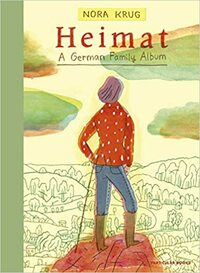Take a photo of a barcode or cover
emotional
informative
reflective
sad
fast-paced
hopeful
informative
reflective
tense
medium-paced
Si puó pensare ad Heimat come la versione graphic novel di Ritratto con signora di Böll, oppure al corrispettivo tedesco di Maus I e II.
Stile visivo superbo, alterna egregiamente illustrazioni, foto storiche, tavole a fumetti, discorsi diretti e indiretti. Straziante quando pieno di speranza, é il libro che tutti dovrebbe leggere per capire come nele guerre nessuno vinca mai, e come la Storia sia fatta da storie di quelle che, in fondo, non sono altro che persone.
Stile visivo superbo, alterna egregiamente illustrazioni, foto storiche, tavole a fumetti, discorsi diretti e indiretti. Straziante quando pieno di speranza, é il libro che tutti dovrebbe leggere per capire come nele guerre nessuno vinca mai, e come la Storia sia fatta da storie di quelle che, in fondo, non sono altro che persone.
medium-paced
I genuinely don't know how to rate it because I see that this is the product of a contemporary German society. Every non-Jew grapples with this, and it's all so fruitless. No one tells you how to deal with this shame you're being handed, but you have to keep it at all times. Also, you've never spoken to a Jew, and if you do, you don't know how to relate to them. I feel like this book is a good testimony to the way Germans feel, deal and grapple with their ancestors but not necessarily a good book to learn anything from for your own life. FYI, you do not inherit guilt. You inherit responsibility. There's a major, major difference. And learn about Jewish joy. We do not just exist in death, we do not just exist in past tense or in Israel or in black hats. We're here, and we love life and experience joy. No reason to be awkward about it.
challenging
emotional
informative
mysterious
reflective
sad
medium-paced
informative
reflective
sad
poignant, emotional , and prescient
emotional
hopeful
reflective
medium-paced
This is one of my favorite books, a difficult-to-categorize story (illustrated memoir, graphic memoir, is it even memoir?) about a young girl growing up in Karlsruhe, Germany, where she notices something strange in their family's backyard. But when she asks her mother, she doesn't get a clear answer. Later, after leaving home in search of something else, she returns to confront her family, their past, her country of birth, its past, and to own it. Throughout the colorful pages, Krug uses photos, archival research, German products, family tree, and more to try and tell the story of Heimat--what it means to belong.
I wasn't sure what I expected, but definitely less walls of text and more illustrations/photographs. Plus it was quite annoying that images broke up the texts sometimes, but other times they didn't. I am reminded once again why I never read books about family histories, because they are dreadfully boring. The only thing that kept me going was that this book's history part took place in WWII, which is a topic I am very much interested in. I also liked the various items of German making that she found. I also wasn't all too excited about the constant need of the girl to apologise for anything and everything Germany did. I get that you feel bad about what your country did, but it was just weird seeing her apologise for it. And one time she even made a comment that she went to meetings of Jewish people and hoped to be adopted as the granddaughter... whut?
emotional
informative
reflective
sad
medium-paced
informative
inspiring
reflective
fast-paced
I was really moved by this book - Nora Krug's attempt to define her "heimat" or sense of belonging is an immensely powerful, part-memoir, part artifact-gathering examination of what it means to be complicit in the face of genocide and mass abuse, and where the line is between participant in something like the holocaust versus follower (not easily defined, and she doesn't try to pin it down, instead leaving it the line unfinished and unsettled), and what it means and how hard it is to piece together your family's past when the people are gone and their stories with them. How do we develop empathy for our family, in all the ways that they are fallen, and in how we recognize those characteristics in ourselves? How do we relate to our home country when we are ashamed of its history? These are the questions Krug asks through pictures, artifacts, recollections, letters, and introspection.





